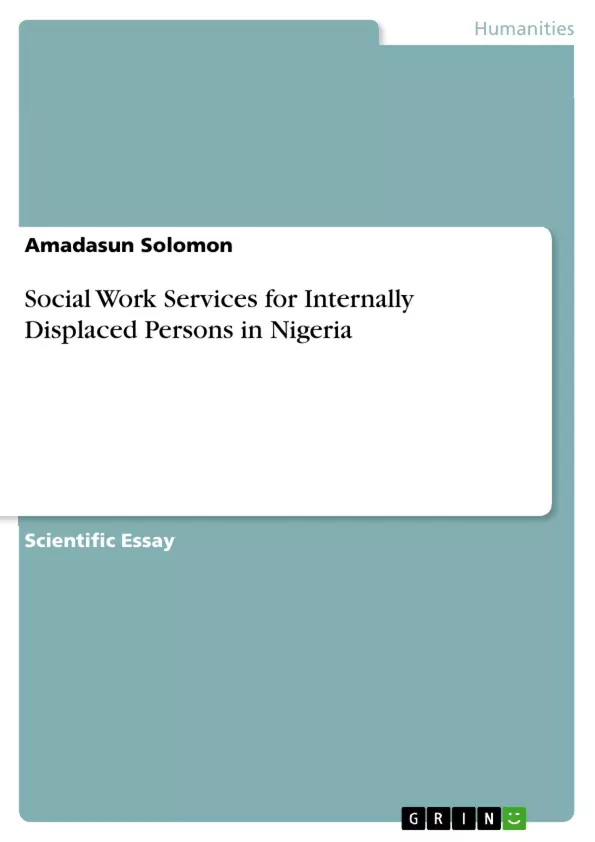One unique feature of the social work profession is the centrality of the person-in environment perspective. The purpose of this study is to examine the nature of social work services to internally displaced persons (IDPs). This research is a qualitative study, conducted with 15 social workers in Nigeria. Data were collected through a semi-structured interview with the participants in Abuja. Results show that social work services are largely inadequate to address the broad range of needs, issues, and concerns of displaced persons. Feasible suggestions that consider the intersectionality between people and their social environment are offered to social workers.
Inhaltsverzeichnis (Table of Contents)
- Introduction
- Literature review
- Method
- Results
- Limitations of the study
- Discussion
- Recommendations
- Conclusion
- References
Zielsetzung und Themenschwerpunkte (Objectives and Key Themes)
This study aims to examine the nature of social work services provided to internally displaced persons (IDPs) in Nigeria. It investigates the adequacy of these services in addressing the multifaceted needs, issues, and concerns of displaced individuals. The study utilizes a qualitative approach, interviewing 15 social workers in Abuja to gather insights into their experiences and perspectives.
- The role and effectiveness of social work services for IDPs in Nigeria
- The challenges and limitations faced by social workers in providing adequate services to displaced populations
- The impact of displacement on the physical, mental, and social well-being of individuals and communities
- The importance of a person-in-environment perspective and ecological framework in understanding and addressing the needs of displaced persons
- The potential of advocacy interventions in improving the provision of social work services to IDPs
Zusammenfassung der Kapitel (Chapter Summaries)
- Introduction: This chapter provides an overview of the global context of internal displacement and its increasing prevalence, highlighting the challenges faced by displaced populations. It emphasizes the significance of social work services in addressing the needs of IDPs and underscores the importance of understanding the nature of these services in Nigeria.
- Literature review: This chapter explores existing research on social work services to displaced persons, focusing on relevant studies conducted in Nigeria and Ukraine. It examines the adequacy of these services and the challenges faced by practitioners in providing effective support to displaced individuals.
- Method: This chapter outlines the research methodology employed in the study, including the participants, data collection methods, and analytical techniques used to examine the experiences of social workers working with IDPs in Nigeria.
- Results: This chapter presents the findings of the study, outlining the nature of social work services currently available to IDPs in Nigeria. It examines the strengths and weaknesses of these services and identifies areas for improvement.
- Limitations of the study: This chapter acknowledges the limitations of the study, discussing potential biases and constraints that may have influenced the findings. It reflects on the scope of the research and its applicability to broader contexts.
- Discussion: This chapter analyzes the study's findings, drawing connections to existing literature and offering insights into the implications of the research. It explores the significance of the study's findings for social work practice and policy.
- Recommendations: This chapter presents recommendations based on the study's findings, outlining strategies for improving the provision of social work services to IDPs in Nigeria. It suggests practical interventions that can enhance the effectiveness of these services and address the specific needs of displaced populations.
Schlüsselwörter (Keywords)
The study focuses on the intersection of social work, internal displacement, and the person-in-environment perspective. Key themes include the challenges of providing adequate services to displaced persons in Nigeria, the impact of displacement on individuals and communities, and the potential of advocacy and ecological frameworks to address the complex needs of IDPs.
Frequently Asked Questions
What is the "person-in-environment" perspective in social work?
This perspective emphasizes that an individual's well-being cannot be understood without considering their social, physical, and political environment. It is central to addressing the needs of displaced persons.
Are social work services for IDPs in Nigeria adequate?
The study shows that current services are largely inadequate to address the broad range of physical, mental, and social needs of internally displaced persons in Nigeria.
What are the main challenges for social workers in Nigeria?
Social workers face limited resources, a lack of specialized training for displacement contexts, and difficulties in navigating the complex intersectionality of the IDPs' social environments.
How does displacement impact individual well-being?
Displacement leads to trauma, loss of livelihoods, and a breakdown of social support networks, which severely affects the mental and physical health of individuals and entire communities.
What recommendations are offered to improve social work for IDPs?
The study suggests adopting ecological frameworks, increasing advocacy interventions, and ensuring that social work services consider the specific intersectional needs of the displaced population.
- Quote paper
- Amadasun Solomon (Author), 2019, Social Work Services for Internally Displaced Persons in Nigeria, Munich, GRIN Verlag, https://www.grin.com/document/490934



